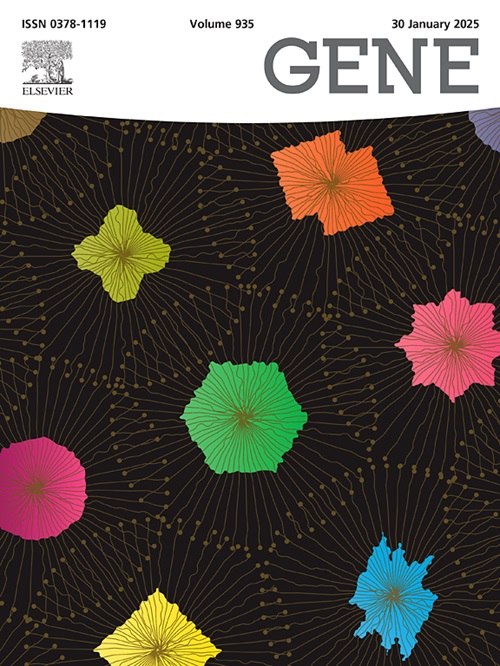一个 1 型眼性白化病家族的 TYR 基因上游区域存在 65 千碱基缺失。
IF 2.6
3区 生物学
Q2 GENETICS & HEREDITY
引用次数: 0
摘要
1 型眼皮肤白化病是由 TYR(酪氨酸酶)基因变异引起的。我们描述了一个有两个受影响兄弟姐妹的家庭,他们从母亲那里遗传了致病性错义 TYR 变异 c.1146C > A;p.(Asn382Lys) ,从父亲那里遗传了 hg38 坐标 chr11:89110944 和 chr11:89175770 之间基因上游区域 65 千碱基对的缺失。由于包括两个缺失断点在内的区域没有序列同源性,因此缺失可能是通过非同源重组产生的。缺失区包含一个与小鼠 5' Tyr 核心调控元件同源的增强子元件。荧光素酶报告分析表明,该元件具有正向调控活性。据我们所知,这是第一个仅限于 TYR 基因非编码上游序列的缺失。据推测,这种缺失会下调 TYR 基因的表达,因此具有致病性,从而可以确诊患者患有 OCA 1。这项研究强调,为了提高白化病患者的诊断率,有必要通过全基因组测序或包括整个基因(外显子、内含子、侧翼序列)的定向下一代测序,将致病变体的搜索范围扩大到调控区域。本文章由计算机程序翻译,如有差异,请以英文原文为准。
A 65 kilobase deletion of the upstream TYR gene region in a family with oculocutaneous albinism type 1
Oculocutaneous albinism type 1 is caused by variants in the TYR (tyrosinase) gene. We describe a family with two affected sibs who inherited the pathogenic missense TYR variant c.1146C > A;p.(Asn382Lys) from their mother and a deletion encompassing 65 kilobase pairs of the upstream region of the gene between hg38 coordinates chr11:89110944 and chr11:89175770, from their father. The deletion likely arose by non-homologous recombination since the regions including the two deletion breakpoints share no sequence homology. The deletion contains a single enhancer element that is homologous to a 5′ Tyr core regulatory element in the mouse. A luciferase reporter assay showed that this element had a positive regulatory activity. This represents to our knowledge the first deletion solely restricted to non-coding upstream sequences of the TYR gene. It is assumed that the deletion down-regulates expression of the TYR gene and is therefore pathogenic, allowing to establish the diagnosis of OCA 1 in the patients. This study underscores the need to extend the search for pathogenic variants to regulatory regions either by whole genome sequencing or by targeted next generation sequencing of a panel including entire genes (exons, introns, flanking sequences) in order to improve the diagnostic rate in patients with albinism.
求助全文
通过发布文献求助,成功后即可免费获取论文全文。
去求助
来源期刊

Gene
生物-遗传学
CiteScore
6.10
自引率
2.90%
发文量
718
审稿时长
42 days
期刊介绍:
Gene publishes papers that focus on the regulation, expression, function and evolution of genes in all biological contexts, including all prokaryotic and eukaryotic organisms, as well as viruses.
 求助内容:
求助内容: 应助结果提醒方式:
应助结果提醒方式:


